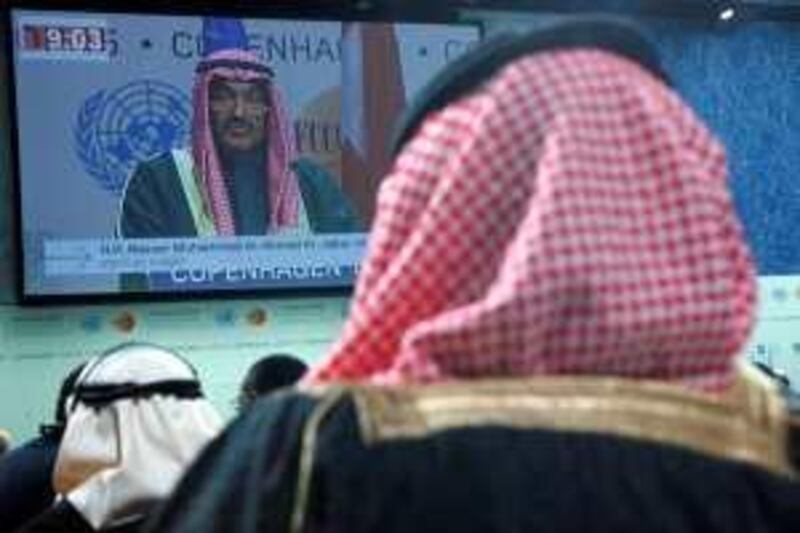COPENHAGEN // Arid Arab countries will be among the worst affected by global warming and want aggressive action by industrialised countries to curb carbon emissions, regional leaders have told the UN's climate summit. As a bloc, they remain more wary about reducing the use of fossil fuels than other parts of the developing world, experts and activists say, but talk from the region's leaders has changed in Copenhagen as they split from Saudi Arabia's position that climate change is a hoax. "The negative impact of climate change on our world is irrefutable," Saad Hariri, the prime minister of Lebanon, said late on Wednesday. "While it may not be in our hands to eliminate it totally, it is within our reach to try to mitigate it." Mr Hariri said Lebanon would seek to boost the ratio of its electricity coming from renewable sources to 12 per cent by 2020, following similar moves by Egypt and Abu Dhabi. Classified as developing states by the UN Framework Convention on Climate Change, none will be legally required to reduce emissions for decades.
Dr Kaoukab al Sabah Daya, the Syrian minister of state for environment affairs, said her country "is one of the countries that is most affected by the worst effects of climate change" as droughts worsen and groundwater supplies dry up. And Kuwait called climate change as "the devastation and the havoc that some have wreaked on Earth". "The state of Kuwait is in the forefront of countries that support and call for the reduction of emissions of greenhouse gases," said Sheikh Nasser Mohammed al Ahmed Al Sabah, the prime minister. Abdullah al Maadhadi, the minister of environment for Qatar, called for "urgent and effective action at all levels to deal with climate change". The UAE and Saudi Arabia were due to speak later last night. The statements suggest a significant shift in the Arab position away from fears that climate policy will hurt oil exports and towards concerns that significant warming could have a direct effect on regional economies, said Wael Hmaidan, the executive director of indyACT, a lobby group based in Lebanon. "The latest Arab position was different from before," Mr Hmaidan said.
"There was no explicit mention of need to protect oil trade; there is demand for developed countries to reduce emissions by 40 per cent from 1990 levels." But he stressed that Arab states could go much further: "I still think that most Arab countries have not absorbed the seriousness of the issue. What makes the Arab region unique is that it is weakest of all regions - in terms of climate policy." Over several years, Arab states had become increasingly aware of the danger of rising sea levels, extreme weather and the threat to their imported food supply, said Dr Walid Fayad, an expert on Middle East climate policy and principal at the consultancy Booz and Company. "Many countries have started developing their own carbon mitigation strategies," Dr Fayad said. "We will see the degree of involvement increasing even further."
Saudi Arabia is the traditional opponent of severe emissions cuts. At the start of the conference last week, Saudi officials said the science behind climate change had been called into question by leaked e-mails from leading climate scientists at the University of East Anglia, showing researchers discussing ways to make their research support the conclusion the Earth was warming as a result of human activities."The level of trust is definitely shaken, especially now that we are about to conclude an agreement that - is going to mean sacrifices for our economies," Mohammed al Sabban, the country's head negotiator, told the conference.A number of independent experts have said the e-mail disclosure, while embarrassing, does not undermine the basic conclusions about global warming reached by scientists across the world. All Arab countries could be affected to some extent by policies that discourage oil consumption, Dr Fayad said that, because Arab states outside the Gulf still rely on economic links with the GCC. But he said governments in the region have recognised that it was in their interest to support emissions cuts. "It will likely be a firm political commitment without any quantitative targets at this stage," Dr Fayad said.
cstanton@thenational.ae
* additional reporting by David George-Cosh





